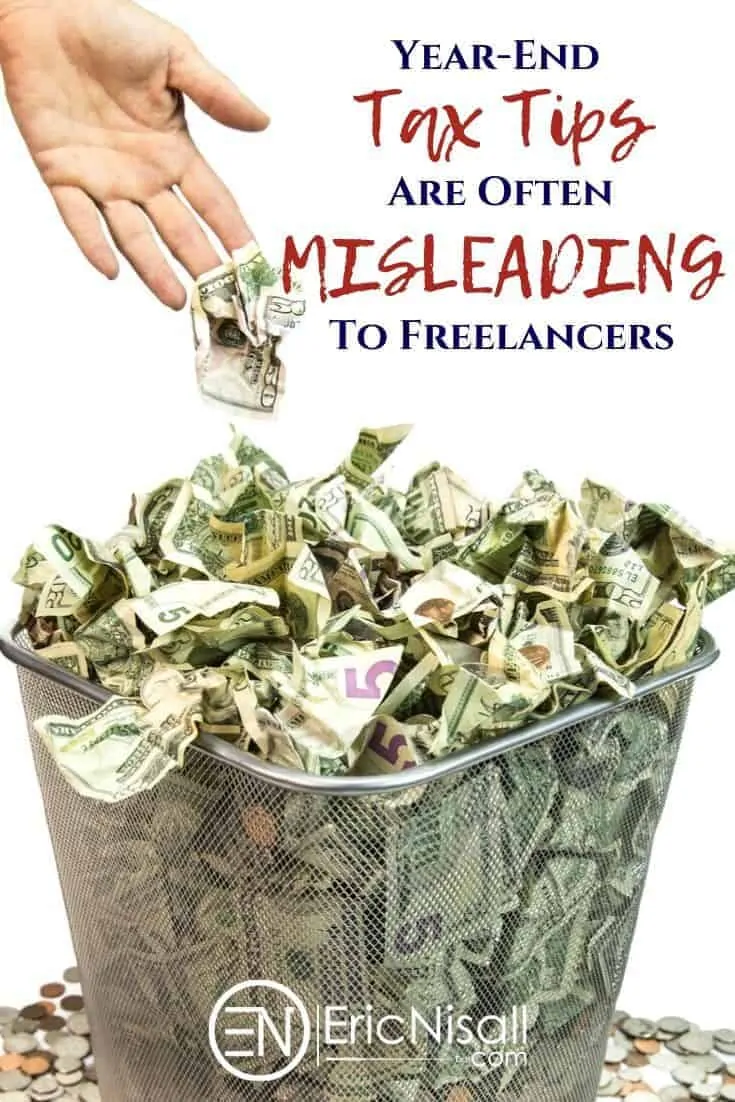Year-End Business Tax Tips Are Often Misleading To Freelancers (Or Just Bad)
This post may have affiliate links. Please read the Disclosure Policy for complete details.
When December rolls around I get a feeling.
It’s not a “sick” feeling, but something else.
It’s more of a sense of impending doom!
I’m just kidding, it’s not that bad.
It comes from the questions I can count on getting.
The questions about taxes and getting ready for it.
This time is commonly known as tax season.
I call it “bad tax advice season”.
Also “everybody publishes the same garbage season”.
Well, not everybody…
Only people writing business tax tips for freelancers.
Every time I see mention of one I cringe.
Not because I hate financial blogs and magazines.
Not because they are always exactly the same as each other because they certainly are.
It’s because they are filled with either confusing, often incomplete information, or outright bad advice.
And because the content is usually never updated and just republished with a more recent date for “freshness” even though if it was bad advice two years ago, it’s still bad advice.
Why do I have such a sour view of this?
Everyone’s An Expert (In Their Own Minds)
These days, anyone can put fingers to keyboard and write an article on any subject.
If you look at the bios of many of the people who write about tax advice for Money Magazine, Kiplingers, or your favorite blog I’m pretty sure you’ll find that they have neither the educational background in accounting or taxation nor the hands-on experience in the two fields.
All they do is research what others have written, and sometimes read the IRS website briefly.
And I doubt many of them interview actual professionals for their expert opinions (although a bunch of them do as I’ve been that interviewee!).
But I could be wrong there.
The problem there is reading and repeating what someone else has already said has two drawbacks for you as the reader and seeker of advice:
- It adds absolutely nothing new to the conversation, and
- They often absorb faulty logic and therefore relay faulty advice to you.
You deserve better, so I’m going to help dispel a couple of these horrible bits of year-end business tax advice you may see out on the web in your quest for assistance.
Spending Money To Save On Taxes Is (Mostly) Dumb
You may be thinking to yourself
Wow, this guy is the one who’s dumb, spending money gives me deductions that will reduce the income tax liability my business generates.
You are absolutely right!
But you’re so wrong too, as is anyone who suggests you do this without any purpose or direction.
Spending money does indeed reduce the business’s net income which you will have to pay tax on (assuming you’re an S Corp or a Schedule C filer).
But it also may hurt your cash flow.
Let’s say you don’t have any immediate business needs, but you go out and spend money on stuff you’ll possibly need down the road (although it isn’t a guarantee right now).
A couple of weeks later, you need to buy a ticket to a conference that you just found out about that could help your business grow exponentially and it’s a fast seller.
Oh, you don’t have quite enough cash to be able to pay for the conference, travel, accommodations, etc. because you blew all that cash at the end of December to lower your tax bill.
Well, at least you got those deductions to lower your tax liability….but not really.
You see, deductions aren’t a dollar-for-dollar proposition.
For every dollar in deductions, you don’t get a dollar reduction to your tax liability.
You may only get a $.20/$1 benefit from all of that spending and be missing out on a huge opportunity for your business to explode.
To put it another way (in a very, very simplistic manner):
Let’s say you spend $100 on your business. You may save 15.3% in self-employment tax and another 20% in federal taxes. That’s $35 in taxes kept in your pocket and $65 spent. But, if you didn’t spend it at all, you’d be paying $35 in taxes and keeping that $65. I don’t know about anyone else, but when I’m given the option, I would always choose to keep the larger piece of the pie. Again, this is assuming you’re spending frivolously for the express purpose of reducing your tax liability.
It’s a whole other matter if you need to spend that money in the current year, or if you have the cash available to cover anything that may come up, but no one cover that part of the story, do they?
Charitable Donations Won’t Help You One Bit
This one is a simple one to explain.
If you run an S-Corp or file a Schedule C on your 1040 Return, you can donate every single penny you have and it will have no effect on the net income of your business.
Charitable contributions go straight to your Schedule A, Itemized Deductions form, which you may not even qualify to use.
And if you can’t itemize, none of your charitable giving will affect your income tax return in any way.
Even if you do, the situation is the same as the business expenses I just went over.
The deduction for charitable giving is not a one-for-one reduction in your income tax liability.
Therefore, you will be spending money to save only a fraction of that amount spent.
Additionally, there are times when “donations” to charity aren’t tax-deductible in part or at all.
If you are a generous person and don’t use the tax deductions as your primary motivation, then donate away.
But if you are doing it just for the sake of reducing your tax bill, it’s ill-advised and I would say to not waste your time or money doing so.
There are plenty of other ways to donate to charity without spending money.
By doing any of those, you not only get that warm fuzzy feeling, but you know for sure that your donation isn’t being used in a way that doesn’t benefit the needy!
Playing With Income Could Screw You Later
Another popular technique told to small business owners is to play with their income.
“Delay recognizing it until after the new year so you can report lower gross income in the current year.”
It sounds good in theory, but there are 2 problems with it:
- If you receive payment and have completed/delivered your obligation then you have to recognize the income then and there. You can’t decide to hold a payment for weeks or even a few days just because you don’t want to report it in the current year. Heck, if you even received the payment on December 31st, you still have to legally claim it as income in the current year. If you want to tell your customers to wait until January to send your payment, that’s perfectly fine, but that’s pretty much the only 100% legal way to go about it.
- By delaying the recognition of income the legal way, you may be setting yourself up for a higher tax bill. Let’s say that your business grows each year (speaking about your net–or taxable–income). By delaying the recognition of income, all you are doing is forcing yourself to pick it up at a time when it could be taxed at a higher rate. Isn’t the point of this whole thing to minimize your tax liability?
Look, we all want to pay as little as possible in taxes, but there are right/smart ways to go about it, and there are wrong/stupid ways.
These two are examples of the latter, and you should be very wary of anyone telling you to do either.
The problem is that no one ever puts these types of issues into these terms.
They just tell you what you can do and leave you to your whims.
And why would they?
Most of the time they’re just repeating the incomplete advice others like them have written.
Always Check With Your Accountant
You should always take into account what qualifications the person giving advice has.
That, and you should never take advice from random people on the internet at face value without consulting your own tax accountant.
And if you don’t have an accountant you trust to advise you on business and tax matters, then I suggest you make it a point to get one
It will be worth the cost to have someone who you know and can trust on these matters.
That’s definitely going to be the case when it comes to the half-truths and incomplete information passed along in the deluge of online publications (and offline too).
After all, it’s called “tax planning” not “wait until the last second tax scramble”.
Your Turn
Have you ever followed tax advice that you read about online only to find out that you shouldn’t have later on? For example, did you read about deducting charitable donations only to discover you can’t take them because you don’t itemize (something that wasn’t mentioned in the first place)? Or did you follow the advice to spend as much as you can, even if you didn’t need to, and then find yourself in a cash bind? Let’s help each other avoid common mistakes such as these!

